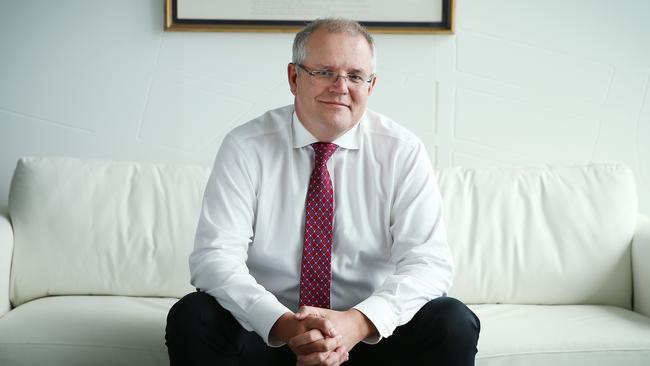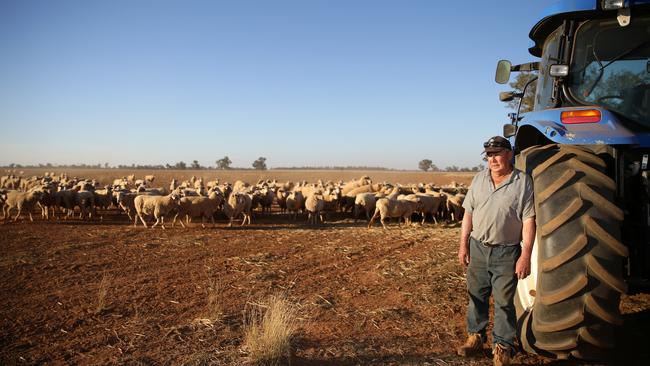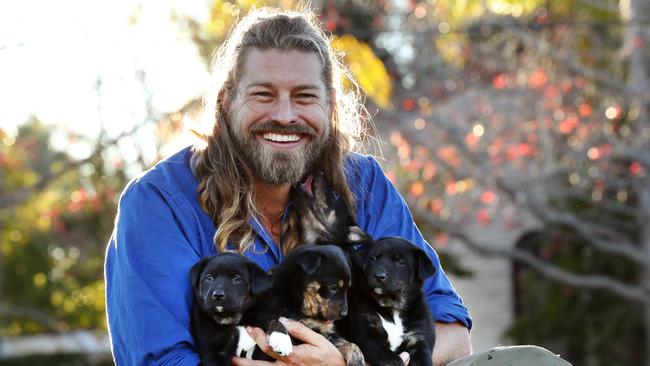Bush Summit: Building a $100b industry by 2030
Prime Minister Scott Morrison is expected to announce soon-to-be finalised plans to boost the size and financial scale of the agriculture, fisheries and forestry industry at The Daily Telegraph’s Bush Summit in Dubbo.
Agriculture, fisheries and forestry will become a $100 billion industry by 2030 under a Morrison government plan to drive jobs in regional and rural communities.
Prime Minister Scott Morrison will announce today that his government will finalise a plan in coming months to boost the size and financial scale of the industry.
Mr Morrison, addressing The Daily Telegraph’s Bush Summit in Dubbo today, will draw on his own family history to urge Australians to respect the “efforts, struggles and values” of those in regional areas.
WATCH PRIME MINISTER SCOTT MORRISON ADDRESS THE BUSH SUMMIT IN THE PLAYER ABOVE
“More recently I have become very concerned about the disconnection between the city and the bush,” Mr Morrison will tell the summit.
“I want us to grow together, not apart.”

Mr Morrison will also reveal a parliamentary select committee will be set up to examine the future needs of rural and regional economies with the Prime Minister promising country people they will be listened to — not dictated to.
“This will bring together the stories and experience of how regional economies are diversifying, finding their way, boosting their resilience and securing their future,” he will say.
Mr Morrison will also pledge greater support for industries such as higher education, mining and tourism that can weather drought and “even out the cyclical aspects of agriculture” for rural economies.
MORE FROM THE BUSH
Daily Telegraph’s Bush Summit to address big issues
Adopt a Farmer and help them through the drought
Children forced to ‘grow up’ as families do it tough
“And I will never allow those in our cities to tell those in our regions and in rural areas what industries they can work in, how they should live or how they should seek to protect their way of life into the future.”
The PM will flag organised farm invasions and research which shows young people struggle to understand the role of farming in the community as cause for great concerns.
“The bush has a wonderful place in the soul of every Australian, whether we have a direct personal connection or not,” he will say.
The PM’s centrepiece announcement today of a plan to grow the nation’s agriculture, fisheries and forestry industries will involve developing more markets, removing no tariff trade barriers and new investments in research and development.
“Our goal is to expand our export markets and lift the share of our two way trade covered by trade agreements to more than 90 per cent by 2022,” he will tell the summit.
“When we came to office it was 26 per cent and it is now more than 70 per cent. Our $100 billion goal is achievable.”

The plan will also see the adoption of new digital farming technologies, access to finance and new efforts to tackle pests and weeds.
Mr Morrison also wants to tackle intergenerational land transfer and encourage new farmers, and provide water needed for growth and drought proofing.
Mr Morrison will identify his grandmother as having given him his first lesson in the bonds that hold communities together.
He will tell the summit how his grandmother left behind Eugowra in western NSW to come to the city and marry his grandfather.
“Mardie, as we knew her … told me that during the depression there always people in the house, crowded round the piano, sharing a meal when they could. It was my first early lesson on the bonds that tie regional and rural communities together.”
Deputy Prime Minister Michael McCormack will also today announce that Major General Michael Jeffery will be reappointed today as the National Soil Advocate.
The government will also provide $2 million over four years to support the work of Soils for Life — an Australian non-profit organisation dedicated to encouraging adoption of regenerative landscape management.
They support the growing number of innovative farmers and land managers who are regenerating their landscapes while maintaining or increasing production.
Mr McCormack said addressing declining soil nutrients was crucial for Australia.
“Government and industry must work as closely together as we possibly can to preserve our soil resources — in fact to deliver even better soils to coming generations. We’re doing just that,” he said.
$11M MILK OF KINDNESS AT SUPERMARKET
Ditching $1-a-litre milk has already given more than $11 million to struggling dairy farmers.
Supermarket giant Woolworths lifted the price of its home brand milk to $1.10 in February this year, with every cent of the increase going to benefit more than 450 farmers.
“It’s been heartening to see our customers continue to back our efforts to support a more sustainable dairy industry,” Woolworths fresh produce director Paul Harker told The Daily Telegraph yesterday.
“Our customers can be confident the benefits of our price changes we made earlier this year are flowing through to dairy farmers each month.”
Dairy Connect CEO Shaughn Morgan said the agricultural advocacy group had been working with Woolworths to ensure dairy farmers directly received the extra money from the milk. “This has made a meaningful difference to dairy farmers across the country and resulted in them being able to pay for their fodder, energy costs and other expenses, which have skyrocketed due to the devastating impact of the drought,” he said.
— by Adella Beaini
FINDING A PAW-FECT WAY TO GIVE
Without working dogs, the nation stops.
It’s a problem farmers and graziers face during drought but one that a Western Sydney organisation is determined to help rectify.
“Farmer Dave” Graham has joined with BackTrack Youth Works to establish a working dog program to give back to farmers in a practical way.

Mr Graham said many farmers often had to let their dogs go along with their stock, but once back on their feet it takes 12 months or more to train a working dog.
“The only way Australia is able to have large stations and farms is because of working dogs,” Mr Graham said. “A typical farm can have anywhere from three to 30 dogs.
“We get troubled youth and give them the skills of managing working dogs and get them to start training the puppies.
“And at the end, we’re giving back to farmers who don’t have time to train these dogs.”



